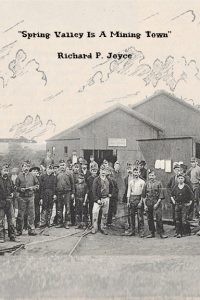Book reviews: Three self-published books shine with labor topics
The book publishing business has changed greatly. Previously, publishing a book required a company to accept the title and then sell the book. Through on-demand, rapid printing and international on-line distribution networks, individuals can share their story directly. Here are three labor-related books, one on Illinois miners, another on insurgent farmers and a building trades worker’s on-the-job novel.
 Spring Valley is a Mining Town
Spring Valley is a Mining Town
Richard Joyce is a retired educator who has spent years digging into northern Illinois coal mining history. Bureau County’s Spring Valley witnessed some incredible battles, as workers organized for protection, safety and a decent life in a cut-throat industry. The Bureau County mines attracted African American migrants and European immigrants seeking a better life. Instead, they found poverty and atrocious safety conditions.
Besides organizing unions, workers voted to control their community. The coal companies meddled in local politics with their anointed candidates. This book looks at those political battles, religious differences between Catholic immigrants and the management-dominated Protestant churches, and fights between moralists and immigrants over the community’s wide- open saloon culture.
When workers struck, troops frequently were dispatched and strikers were killed. The strikers inflicted their own retribution on the coal companies and strikebreakers.
Spring Valley is just one small town in Illinois; this book effectively captures the “wild and woolly” boom town days as mining attracted a diverse workforce with their own unique dreams and aspirations.
Spring Valley is a Mining Town is available for $20 from Lulu.com.
Farmers are not usually viewed as political radicals but in the late 19th century farmers revolted against banks, railroads and corporate control, in a movement known as “populism.” Populism is used in today’s political discussions with candidates who are corporate aligned yet appeal to voters’ fears. The actual populists were anti-corporate crusaders, struggling to survive falling prices and higher costs.
Forgotten Populists: When Farmers Turned Left to Save Democracy is by retired Wayne State University labor educator Steve Babson. He has written multiple books on labor topics; Forgotten Populists is a 51-page, well-written and easily accessible essay on this uniquely American movement.
After the Civil War farmers found new markets through the railroad network. But railroads charged high rates at the same time crop prices were falling. During the Civil War the U.S. printed “greenbacks,” paper money, which created a more fluid economy and easier credit. After the war banking interests wanted all money redeemable for gold, which tightened the money supply and made credit more difficult.
Fed-up farmers across the South, the Great Plains and the Midwest revolted. They organized their own political parties that sought railroad and corporate regulation and a more fluid credit economy. They made great gains in state legislatures and elected some members to Congress. In 1896 Illinois-born Williams Jennings Bryan won the Democratic Presidential nomination, with his famous quote: “You shall not press down upon the brow of labor this crown of thorns. You shall not crucify mankind upon a cross of gold.” The Republican Party spent heavily to defeat Bryan, with William McKinley winning the presidency.
Thanks to the populists’ corporate regulations, the income tax and workers’ rights eventually won the political battle. The populist movement created change, yet it also floundered on sectional, racial and gender divisions. Babson has created a quick read, wonderfully illustrated, that places the term “populist” in its original, anti-corporate roots.
Forgotten Populists is available via Amazon for $14.95.
A construction worker’s job site novel
Bill Yund is a retired Asbestos Workers Local 2 member from Pittsburgh and an incredible illustrator.
During COVID he became a novelist. Paradise, Haunted Seeds and Boiled Cats combines three on-the-job construction stories featuring insulators. Construction work and its daily rhythms have rarely found a truer voice than from this worker who lived through it.
This book could be called a triple A, “Alcohol, Adultery and Accidents,” though a fourth “A,” asbestos, lurks. Yund well captures not only construction sites’ organized chaos but also the unique workplace personalities.
The first story centers around a bar, Paradise, as a young cub apprentice finds his way into the trade, learns who he can trust and finds love in the bar, as the relationship between the bar owner and a young woman is slowly revealed. The eager young man discovers that true love can conquer and a run-down bar hides secrets and opportunities.
In the second tale, Cole likes nothing more than a fast car and cold brew, which eventually leads to tragedy and an alcohol-fueled downward spiral. Cole finds sobriety and a stable relationship with Delsy, a waitress with her own hidden backstory. Together they build a stable life, but Delsy’s backwoods grandmother darkly nurtures her own demons, leading to an inevitable tragedy.
In the final tale, “Swingbelly” Kelly is an easy-going tradesman, loose with women and alcohol but his affable nature ensures the job’s completion. Renovating pipes in an urban high-rise unfolds as each apartment reveals a new character. Kelly finally settles down with a high school sweetheart who lives there, but a mystery lurks – who killed that strange woman’s cats?
Yund’s wonderful illustrations set the scene, every worker has a nickname, job site pranks sometimes turn sinister, and the local union bails out the crew multiple times, offering new jobs and new opportunities if these trades workers can just keep their nose clean.
The book is available from Barnes & Noble for $11.90.
Reviewed by Mike Matejka, a Vice President of the Illinois Labor History Society


